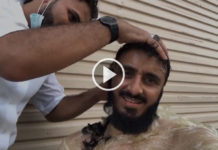All praise is due to Allah, who created mankind for the purpose of His worship. I testify that there is no deity worthy of worship except Allah. I equally testify that Mohammad saws is his servant and Messenger. May peace and blessings be upon the Prophet saws, his family and his companions.
One of the Salaf (the righteous predecessors) said:
| Indeed, Allah has bestowed His favour upon His servants and commanded them to be grateful as much as they can, for gratitude, however little it may be, is a price for the favour, however big it may be. If one does not be grateful, he has exposed the favour to extinction |
Dear brother! A believers soul does not yield to frivolities; however, his soul becomes tranquil, that tranquillity energises it and tells it, O soul! Be happy, for the home is near and reunion is imminent. Therefore, do not terminate your journey and thus be denied reaching the home of the loved ones. When Naafi was asked of Ibn Umars ra activities at home, he replied,
| He used to perform ablution for every prayer and recite Quran in between them [i.e. in between ablution and prayer.] |
Hasan al-Basree said while describing efforts of Salaf in worship
| , I have met people and I have accompanied groups. They (i.e. the people I have met and accompanied) did not use to rejoice at whatever came their way of the beauties of this world; nor did they use to get sad over whatever departed from them of this world. Rather, the world was less significant to them than the soil over which they walked. They would act by the book of their Lord and the sunnah of the Prophet saws. During the night they stood up in prayer, prostrated their faces and wept out of fear of Allah. |
Whenever Ibn Umar ra missed a congregational prayer, he would atone for that by a day of fasting, a night vigil (in prayer) and manumission of a slave.
Umar ibn Abdil-Azeezs wife said,
| I have never seen anyone who prayed fasted and feared Allah more than him (meaning her husband). He would pray Salaatul-Eshaa and then sit down doing Adh-Dhikr [remembering Allah] until he was overcome by slumber. He would remember some of the issues of the Last Day while he was on his bed and tremble like a sparrow and then sit down weeping. I would then cover him with a sheet. |
Wakee said,
| Al-Amash never missed the first Takbeer (in a congregational prayer) for almost seventy years and I visited him for more than six years, and I have never seen him performing a missed Rakaah. |
Sulaymaan Ibn Hamzah also said,
| I have never prayed an obligatory prayer alone except twice and even then I felt as if I had not prayed it at all. |
It should be noted that he was almost ninety years old when he died.
These are just a few examples from a people whos hearts were full of love for Allah in all their conditions; they then became delighted, their souls became tranquil and peace ruled over their limbs. Then, thoughts of love replaced those of disobedience, the will to move nearer to Him replaced that of displeasing Him and movements of the tongue became that of obedience or contrary to disobedience.
As for the Prophet saws, love of worship has penetrated deep into his heart and the greatest manifestation of his worship is that he submitted his whole life to Allah in all his conditions. Allah says,
| And who can be better in religion than one who submits his face (himself) to Allah and he is a Muhsin (a good-doer). (an-Nisaa 4: 125) |
The Prophet saws used to fear Allah and always seek for his forgiveness. He said,
| By Allah! I indeed invoke Allah for forgiveness and repent to Him more than seventy times a day. (Al-Bukhari) |
He used to worship Allah in the night and would keep on standing until his legs became swollen and when he was asked,
| O Messenger of Allah! You do this when your former and latter sins have been forgiven? He saws would reply, Should I not then be a grateful slave? (Al-Bukharee and Muslim) |
However, the most wonderful aspect of the Prophets saws worship is that astonishing combination of the highest level of worship and performance of his role as the head of his Ummah. He said,
| By Allah! I am the most fearful of Allah among you, but I fast, and eat; I pray and I sleep and I marry women. Whoever dislikes my way is not of me. (Al-Bukhari) |
Ibn Taymiyyah said,
| The heart cannot be good, prosper, have felicity and easiness, enjoy and have tranquillity except through the worship of its Lord alone. Even if it attains all pleasures of this world it will not get peace and tranquillity, for it has a natural spontaneous need to its Lord because He is its Lord |
Brothers in faith! The greatest type of worship is to perform that which Allah makes obligatory on His servants and to refrain from all that He forbids. Abu Hurayrah ra narrated that Prophet saws said,
| Allah says, The most beloved things with which my slave comes nearer to me is what I have enjoined on him. (Al-Bukharee). |
Ibn Al-Qayyim said,
| Since the Salaf lived their whole life in worship it is then necessary for us to know, with which type of worship they started and which one have they given priority. |
He then answered, the best acts of worship are the most pleasing to Allah in that particular time. The best act of worship during the presence of a guest is to take care of him and to be distracted by that from recommended acts of worship. This is also in performing ones duties towards ones wife and family. The best act of worship in the night is to be occupied with prayer, reciting the Quran, supplication and Dhikr. The best thing during the time of the Adhaan is to leave whatever worship one is doing and answer the Muadhdhin (by repeating what he says). The best thing during the time of the five obligatory prayers is to exert one’s efforts in their prompt performance. The best thing when the poor is are dire need of assistance is to assist them and give that preference over supererogatory Dhikr. The best thing to do when your brother is sick or dead is to visit him, attend his funeral, and give that priority over your supererogatory Dhikr. And the best thing to do when you are afflicted and suffer peoples harm is to be patient and not to run away from them. The Muslim should be moving in between stations of servitude. If you see the Ulamaa you see him with them; if you see those who are devotedly performing acts of worship, you see him with them, and if you see those giving generously in charity, you see him with them!
Fellow Muslims! Allah says,
| And I created not the jinn and humans except that they should worship Me (alone). (Adh-Dhaariyaat 51: 56) |
This verse plainly explains the purpose of our creation; that our lives should not be spent except in worshipping Allah. Prayer, fasting, alms giving, Hajj, truthfulness, trustworthiness, being dutiful to parents, supplication, reading the Quran, hoping for Allahs mercy and being afraid of His punishment are all acts of worship.
Brothers in faith! Indeed what has afflicted Muslims in the course of their long history and what is afflicting them today is a consequence of their deviation from the real concept of worship and application of the two conditions of worship which are: sincerity and following path of the messenger of Allah. While abandoning sincerity lead to directing acts of worship that are solely Allahs to others besides Him; lack of following the path of the Prophet saws leads to the appearance of various kinds of worship on which there is no permission from Allah nor recommendation from His Prophet saws.
However, some people restrict the concept of worship to rituals only. Whenever this set of people works, they abstain completely from worship and whenever they worship, they keep away completely from work. This is unfortunately the most common belief. It is the people who hold this concept who say, What does religion have to do with a womans dressing and her work? What does religion have to do with our personal behaviour? Their purpose is to remove religion from ones life and confine it only to the mosque. That is why you see someone who prays, fasts, and reads Quran, yet cheats, bribes and takes bribes and wrongs others. You also see a woman who prays yet disobeys laws of Allah by dressing immodestly and mingling with men.
Brothers in Islaam! Deeds towards which one is naturally inclined become acts of worship through good intentions. The farmer in his farm, the labourer, the trader, or the practitioner of any other profession is capable of turning his occupation into an act of worship, provided that he does not tarnish it with cheating, lying, tricking etc. This is the concept of worship in its wider sense. To have a full imagination of acts of obedience makes a Muslim full of good, mercy, and benefit for his fellow human beings, thereby encouraging him to do more acts of worship and assist his Ummah.
My dear brother! It is possible for you to add a viable brick into the structure of this Ummah and add to your scale of good deeds weighty works, which may appear insignificant to you. Listen to what the Prophet saws said,
| Do you want me to tell you of what is better than the rank of fasting, prayer and charity? The Companions said, Yes, O Messenger of Allah. He said, Making peace between people among whom there is discord. (Abu Dawood)
He also said, Whoever visits a sick person or a brother of his for Allahs sake, a caller will call him thus, You are good and your passage is good. May you take Paradise for an abode. (At-Tirmidhee). |
Muslim reported on the authority of Abu Hurayrah ra that the Messenger of Allah saws said
| , While a man was walking along the road, he saw a branch of a tree with thorns lying on the road and he removed it, so Allah thanked him for that and forgave him (his sins).
Muslim also reported that the Messenger of Allah saws said, Deeds of my nation both the good and evil were shown to me and I found that among their good deeds is removal of harmful things from the pathway. |
Restricting righteous deeds to special acts of worship makes seekers of piety spend all their time in repetition of limited deeds as if they do not see that other ways lead to the pleasure of Allah.
Brothers in Islaam! Fear Allah and beware of all things that invalidate worship or remove its reward. Among these are associating partners with Allah and showing off. Allah says,
| If they had joined in worship others with Allah all that they used to do would have been of no benefit to them. (Anam 6: 88) |
Another act that invalidates worship is innovation. The Prophet saws said,
| Whoever does a deed upon which there is no order from Us will have it rejected. |
Doing injustice to others also destroys ones worship. The Prophet saws said,
| The bankrupt among my Ummah is the one who comes on the Day of Resurrection with prayer, charity and fasting and yet has abused someone, slandered someone, taken someones money illegally, shed someones blood and beaten someone. Each of these people will be given of his good deeds (by way of compensation). If his good deeds however finishes before judgement is passed on him, parts of their sins will be thrown on him, and he will then be cast into Hell. (Muslim) |
Of these things that invalidate ones worship is filthy words uttered by some people without thinking of its consequences. The Prophet saws said,
| A man may utter a word (carelessly) which displeases Allah without thinking of its gravity and because of that he will be thrown into the Hell-fire. (Ibn Maajah). |
The Prophet saws also told us of a man who said,
| By Allah! Allah will not forgive so and so. Allah then said, Who is that person swearing by Me that I will not forgive so and so? I have indeed forgiven him and render your own deeds fruitless! (Muslim) |
In Saheeh Muslim, the Prophet saws said,
| A man passed by a tree branch on a road and said, By Allah! I shall remove this away from the Muslims lest it harms them. For that, he was admitted to Paradise. |
Brothers in faith! Worshipping Allah does indeed necessitate using all ones limbs in his obedience and carrying out His orders. One should then worship Allah by preventing his eyes from watching unlawful things and using them to look at what Allah loves, like a copy of the Quran, books of knowledge &c. He should also worship Him by preventing his ears, hands and feet from all that Allah forbids and using them in things that He enjoins and loves. Allah says,
| Say (O Mohammad saws), Verily my Salat (prayer), my sacrifice, my living and my dying are for Allah, the Lord of the Aalameen (mankind, jinns and all that exists). He has no partner. And of this I have been commanded, and I am the first of the Muslims. (Al-Anaam 6:162-163) |






















